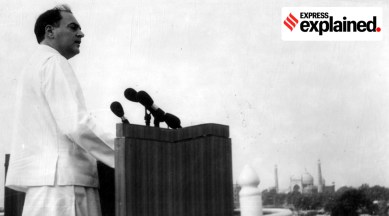This Quote Means: ‘Development is not about factories, dams and roads. Development is about people.’
On his death anniversary, we remember a quote from Rajiv Gandhi, former prime minister of India credited for his role in the liberalisation of the Indian economy. Quotes from historical personalities are an important part of the syllabus for the UPSC CSE paper.

Rajiv Gandhi was assassinated on May 21, 1991, by a suicide bomber at an election rally in Sriperumbudur. The assassin was a member of the Sri Lankan Tamil separatist organisation Liberation Tigers of Tamil Eelam (LTTE), which held deep-seated grievances against Gandhi due to his government’s involvement in the Sri Lankan Civil War. India’s former Prime Minister was only 46 at the time.
Rajiv Gandhi served as the Prime Minister of India from 1984 to 1989. While his reign is often remembered more for the many controversies and crises he faced, he can also be credited for his role in the process of liberalisation of the Indian economy. As a leader, Gandhi was always bullish about India’s potential in the fast-changing global economy.
Today, at a time when “development” has become a buzzword used by politicians of all ideologies, we take a look at what Rajiv Gandhi had to say on the matter.
Quotes by historical and political figures are a key part of the syllabus for the UPSC CSE paper.
The quote
“Development is not about factories, dams and roads. Development is about people. The goal is material, cultural and spiritual fulfilment for the people. The human factor is of supreme value in development.”
Development is often equated to building infrastructure. While infrastructure is unarguably important, it should not be the end in and of itself. This is what this quote by Rajiv Gandhi emphasises upon. The one and only end-goal of development is to improve the lives of people, with everything else a means to that end.
We break the quote down further.
“Development is not about factories, dams and roads. Development is about people. ”
The concept of development emerged in the post World War II era, when European colonialism was on its way out and a number of independent countries in what we today call the Global South emerged. In the early years, modernisation theory was the dominant framework in development discourse and practice. It emphasised industrialisation, technology transfer, and Western-style institutions as pathways to progress.
Notably, there was an exaggerated emphasis on infrastructure projects. Beyond the human benefits of such projects, they were also seen as symbols of modernity and progress. In India, the focus on infrastructure can be seen in Nehru’s efforts in building dams and other key infrastructure.
While infrastructure development is undoubtedly necessary, it is not sufficient. This is what the Rajiv Gandhi quote tries to convey. Development itself is not about the “factories, dams and roads”, it is about the people who are to be benefited from it. That always has to be the central consideration while thinking of development.
While the tangibility of mega infrastructure projects makes it easy to cite them as evidence of development, real development focuses on human beings as the ultimate end (and means) of development.
“The goal is material, cultural and spiritual fulfilment for the people.”
Rajiv Gandhi further details what the goal of his people-centric idea of development is over here.
Material fulfilment – meeting basic needs, having prosperous lives – is important. But so is the cultural and spiritual fulfilment of people. While modernisation theory focussed on material development, that too in a limited sense, today, development thinkers and planners acknowledge the complexity of human existence and consequently multifaceted nature of human requirements.
Cultural fulfilment refers to preserving and enriching cultural practices, traditions, and identities. Spiritual fulfilment, on the other hand, encompasses the sense of purpose, values, and beliefs that provide individuals with a deeper meaning in life.
Development which undermines people’s cultural and spiritual requirements might not actually be progress at all. Since the ultimate aim is to “benefit people”, development thinking needs to take into account the contextual specificities of any given situation, and encourage people to themselves participate in determining what development looks like.
It is only this holistic understanding of development that can lead to real progress in terms of improving people’s lives.
The concept of human development
Beyond development being for the people, it must also be of the people. This is the essence of human development – it refers to the process of expanding people’s choices, their capabilities, and their freedoms in order to enable them to live a life they themselves value and cherish. At the core of this is the notion of human agency — the idea that individuals should have the ability make choices and shape their lives.
While theories on development were more ‘top-down’ in nature, human development focusses on empowering people themselves to improve their lives. This calls for focus and investment on education, healthcare, gender equality, social inclusion, etc.
When Rajiv Gandhi says that “The human factor is of supreme value in development,” he is also specifically emphasising on human development. He would undertake a number of measures during his time as the prime minister to this effect, including introducing the New Education Policy in 1986.